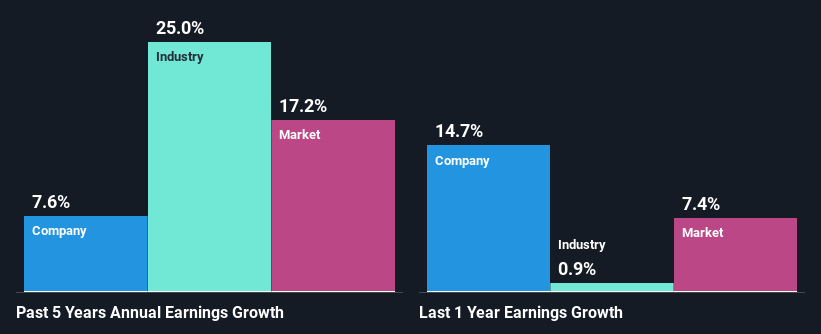Declining Stock and Solid Fundamentals: Is The Market Wrong About OMER S.p.A. (BIT:OMER)?
It is hard to get excited after looking at OMER's (BIT:OMER) recent performance, when its stock has declined 13% over the past month. However, a closer look at its sound financials might cause you to think again. Given that fundamentals usually drive long-term market outcomes, the company is worth looking at. Specifically, we decided to study OMER's ROE in this article.
Return on equity or ROE is an important factor to be considered by a shareholder because it tells them how effectively their capital is being reinvested. In simpler terms, it measures the profitability of a company in relation to shareholder's equity.
Check out our latest analysis for OMER
How Do You Calculate Return On Equity?
The formula for ROE is:
Return on Equity = Net Profit (from continuing operations) ÷ Shareholders' Equity
So, based on the above formula, the ROE for OMER is:
16% = €9.3m ÷ €58m (Based on the trailing twelve months to June 2024).
The 'return' is the income the business earned over the last year. One way to conceptualize this is that for each €1 of shareholders' capital it has, the company made €0.16 in profit.
What Has ROE Got To Do With Earnings Growth?
Thus far, we have learned that ROE measures how efficiently a company is generating its profits. We now need to evaluate how much profit the company reinvests or "retains" for future growth which then gives us an idea about the growth potential of the company. Generally speaking, other things being equal, firms with a high return on equity and profit retention, have a higher growth rate than firms that don’t share these attributes.
OMER's Earnings Growth And 16% ROE
To start with, OMER's ROE looks acceptable. Further, the company's ROE compares quite favorably to the industry average of 12%. Probably as a result of this, OMER was able to see a decent growth of 7.6% over the last five years.
Next, on comparing with the industry net income growth, we found that OMER's reported growth was lower than the industry growth of 25% over the last few years, which is not something we like to see.

Earnings growth is a huge factor in stock valuation. The investor should try to establish if the expected growth or decline in earnings, whichever the case may be, is priced in. By doing so, they will have an idea if the stock is headed into clear blue waters or if swampy waters await. Is OMER fairly valued? This infographic on the company's intrinsic value has everything you need to know.
Is OMER Making Efficient Use Of Its Profits?
OMER's three-year median payout ratio to shareholders is 17% (implying that it retains 83% of its income), which is on the lower side, so it seems like the management is reinvesting profits heavily to grow its business.
Along with seeing a growth in earnings, OMER only recently started paying dividends. Its quite possible that the company was looking to impress its shareholders.
Summary
On the whole, we feel that OMER's performance has been quite good. Particularly, we like that the company is reinvesting heavily into its business, and at a high rate of return. As a result, the decent growth in its earnings is not surprising. Having said that, the company's earnings growth is expected to slow down, as forecasted in the current analyst estimates. To know more about the latest analysts predictions for the company, check out this visualization of analyst forecasts for the company.
New: AI Stock Screener & Alerts
Our new AI Stock Screener scans the market every day to uncover opportunities.
• Dividend Powerhouses (3%+ Yield)
• Undervalued Small Caps with Insider Buying
• High growth Tech and AI Companies
Or build your own from over 50 metrics.
Have feedback on this article? Concerned about the content? Get in touch with us directly. Alternatively, email editorial-team (at) simplywallst.com.
This article by Simply Wall St is general in nature. We provide commentary based on historical data and analyst forecasts only using an unbiased methodology and our articles are not intended to be financial advice. It does not constitute a recommendation to buy or sell any stock, and does not take account of your objectives, or your financial situation. We aim to bring you long-term focused analysis driven by fundamental data. Note that our analysis may not factor in the latest price-sensitive company announcements or qualitative material. Simply Wall St has no position in any stocks mentioned.
About BIT:OMER
OMER
Designs, develops, manufactures, and sells components and interior furnishings for railway vehicles in Italy, rest of European Union countries, and internationally.
Flawless balance sheet with proven track record.
Market Insights
Community Narratives




